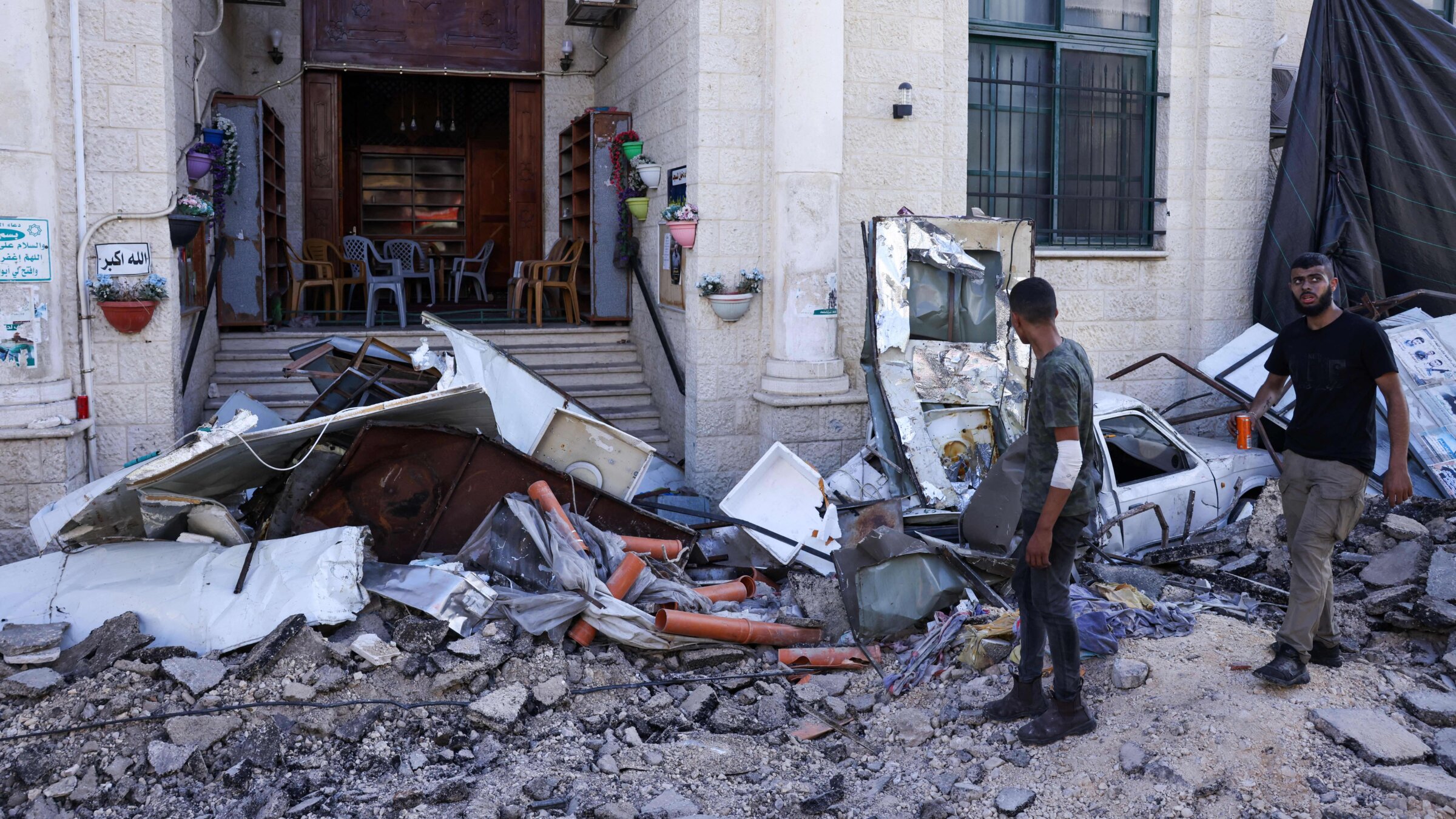Israel has a problem in Jenin — with an obvious, radical solution
An increase of terrorist violence in and around the Jenin refugee camp can’t be resolved by IDF interference

Men walk among rubble in front of a building in the occupied West Bank city of Jenin on July 4, 2023. Photo by RONALDO SCHEMIDT/AFP via Getty Images
To understand events in the occupied West Bank after the Israel Defense Forces killed at least eight people in a Monday attack on the Jenin refugee camp, we need to rewind to March 2022.
That’s when Israel launched Operation Breaking Waves, with extensive military activity to target growing terrorist operations in Jenin, Nablus and other nearby Palestinian towns.
Except rather than effectively eliminating the terrorist cells, the IDF intervention emboldened them.
It drew ire from the Palestinian public, which grew increasingly angry with the Palestinian Authority for appearing to collaborate with Israel, and for not protecting civilians. That anger sparked the emergence of a new group of terrorists, commonly referred to as the “Lion’s Den” — young Palestinian men, loosely affiliated with the prominent traditional terrorist organizations, who started acting together not through those historic political alliances, but rather based on their geographical location.
As the situation spiraled, it became apparent the Palestinian Authority didn’t have the capacity — or, necessarily, the desire — to get ahead of the situation. Jenin became even more of a hub for terrorist activity, and a refuge for terrorists. Those in the area started producing homemade explosives and makeshift rockets.
Anyone could have foreseen that the result would be an extensive Israeli military operation — especially considering that the current Israeli government holds a hardline anti-Palestinian agenda.
Official IDF statements have so far framed Monday’s massive IDF incursion in Jenin not as an “operation,” which is sometimes code for war, but as targeted counter-terrorism activity. That framing aspires to convince skeptics that the current onslaught will be restricted in scope and time. IDF authorities have promoted the apparently limited goal of dismantling terrorist infrastructure in the Jenin refugee camp, and ensuring IDF freedom of movement in the area.
The crucial question for observers: Does Israel actually stand any chance of accomplishing that goal, without worsening an already deteriorating situation?
The odds are stacked against it. The U.S., Israel’s most important ally, has recently become increasingly critical of the government’s policy in the Palestinian arena. And while Israel’s embattled Prime Minister Benjamin Netanyahu may, through the careful framing, be attempting to demonstrate something like respect for the importance of an effective Palestinian Authority to Israel’s national security, his strategy is also to keep that authority weak. That strategy has, to date, only worsened the Palestinian Authority’s domestic challenges, including its rivalry with the Islamist Hamas.
So long as the Palestinian Authority cannot deliver progress toward Palestinian statehood — a necessary inertia, in the view of Netanyahu’s government — violent resistance will continue to gain traction in the occupied West Bank.
In the face of those obstacles, it should be clear to all that military action in Jenin will never be enough to create substantial change.
What could Israel do that might actually lead to a meaningful improvement of the situation?
First, the government must gain a broader perspective on the ongoing crises that have contributed to this dire situation.
The Palestinian Authority is facing a fiscal crisis, and is paying only partial salaries to members of the public sector, including teachers and officers of the Palestinian Security Apparatuses. Recent reports show that many officers are seeking employment in the private sector due to their growing debts, and the teachers were on strike for half of the latest school year.
The result: The Palestinian Authority’s citizens don’t trust it — a particularly intense problem in areas like Jenin, which is isolated on the periphery of the authority’s area of control.
That deeply-rooted problem cannot be fixed by military action. To make headway, Israel must enact a serious strategic shift, and consider working to strengthen the Palestinian Authority.
Only when Israel invests in economic, political and diplomatic efforts within the West Bank — and curbs the elements within the Israeli government who wish to see the Palestinian Authority collapse — will we move forward to a time when more violence in and around Jenin is no longer a tragic certainty.
Listen to That Jewish News Show, a smart and thoughtful look at the week in Jewish news from the journalists at the Forward, now available on Apple and Spotify:

















